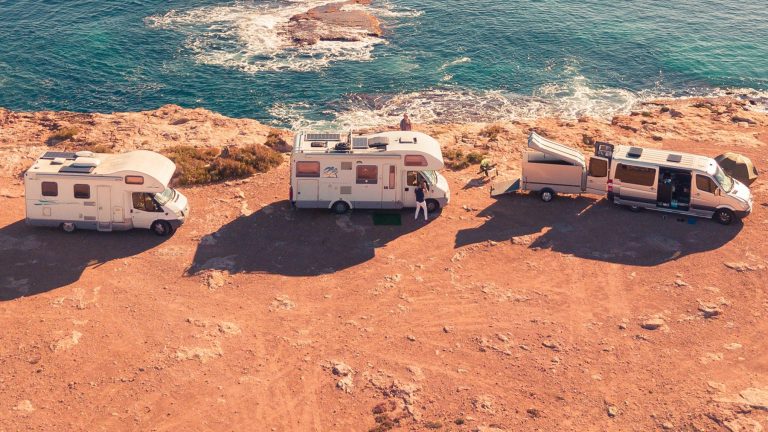
Traveling Australia by campervan is the ultimate freedom on wheels – but should you buy or rent a campervan in Australia for your adventure? In this 2025 updated guide, we’ll break down the pros and cons of buying vs renting a campervan (or motorhome) using the latest facts and prices. We’ll also share practical tips to help you decide which option best suits your trip – whether you’re on a short holiday or a year-long working holiday. Read on for a detailed comparison, including a quick summary table, and our recommended campervan partners (like Travellers Autobarn and Motorhome Republic) for the best deals and support.
Table of Contents
Quick Comparison: Buying vs. Renting a Campervan
To start, here’s a summary of how buying a campervan compares with renting one in Australia, based on key factors like cost, flexibility, risk, and ideal type of traveler:
| Factor | Buying a Campervan | Renting a Campervan |
|---|---|---|
| Price Range (2025) | High upfront cost – typically A$9,000–$15,000+ to purchase (you may recoup 50–80% on resale). Ongoing costs for rego, insurance, maintenance. | Pay-as-you-go – roughly A$80–$200 per day rental rate depending on vehicle and season. Additional costs for insurance options and bond (security deposit). |
| Flexibility | Very high: You own the van, so no fixed return dates or route restrictions. Travel at your own pace, change plans on a whim. Great for exploring offbeat places (with caution). | Moderate: You must return the vehicle by a set date/location, and abide by rental T&Cs. Some remote areas or unsealed roads might be off-limits under rental agreements. |
| Risks & Responsibilities | Higher: You’re responsible for breakdowns, repairs, and all paperwork (registration transfers, roadworthy checks, etc.). Risk of losing money if you can’t resell or if the van has mechanical issues. Requires time to buy and sell. | Lower: The rental company handles maintenance and 24/7 roadside assistance in case of issues. No need to worry about selling the vehicle. However, you might forfeit a hefty bond for any damage, and you’re liable for insurance excess if accidents occur. |
| Ideal For | Long-term travelers (generally trips 3+ months). Backpackers on working holidays or gap years who want a home-on-wheels and maximum freedom, and who don’t mind handling vehicle upkeep and resale. | Short-term travelers (trips of a few days up to 2 months). Those who prefer a convenient, hassle-free road trip with support, or anyone unsure about committing to one vehicle for the whole trip. Great for a one-off Australian vacation or trial run of van life. |
Use the table above as a starting point. Next, we dive deeper into each option with updated 2025 information, including detailed benefits, drawbacks, and tips for making the most of your Australian campervan road trip.
Buying a Campervan in Australia: The Road to Ownership
Buying your own campervan (or car/van to convert) can be incredibly rewarding. You’ll have complete ownership and control over your journey – but it also comes with responsibilities. Here are the updated pros and cons of buying a campervan in Australia in 2025, along with tips if you choose this route.
Benefits of Buying a Campervan
- Total Freedom & Customization: When you own the van, it’s truly your home on wheels. Want to detour down a dirt track or stay extra nights in Byron Bay? No problem – no rental deadlines to worry about. You can also personalize the campervan to your liking (paint it, add curtains, install solar panels, etc.).
- Cost-Effective for Long Trips: If you’re traveling for an extended period, buying can save you money in the long run. Rental costs add up quickly.
- Resale Value (Recoup Your Investment): Unlike rental fees which are gone forever, buying a campervan lets you recoup some money at the end. If you buy at a good price and take care of the vehicle, you might resell it to another traveler for near what you paid. In some cases, travelers even make money on resale if demand is high.
- Negotiation & Deals: You have the chance to hunt for bargains and negotiate. For example, you might find a well-equipped older campervan being sold by a traveler finishing their trip. With patience and bargaining, you could score a great deal within your budget.
Disadvantages of Buying a Campervan
- High Upfront Cost: Buying requires a significant upfront spend. You’ll need enough cash for the purchase price plus extra for things like registration (“rego”), insurance, and any immediate repairs or roadworthy inspections.
- Maintenance & Responsibility: When you own the campervan, all the responsibility is on you. If it breaks down or needs repairs, you’ll have to deal with mechanics and cover the costs. Also, regular maintenance (oil changes, tire replacements) is your duty.
- Paperwork & Registration Hassles: Buying and owning a vehicle in Australia involves admin that can be complex for newcomers. Each state has different registration transfer rules. These procedures can be time-consuming and confusing, especially if you’re unfamiliar with Australian bureaucracy.
- Time to Buy and Sell: Unlike renting (where you pick up and drop off quickly), buying a van means investing time to find the right vehicle and later to find a buyer. It’s common to spend 1–2 weeks (or more) searching advertisements, inspecting vans, and handling the purchase paperwork. Likewise, when your trip ends, you should allow time to advertise and sell the vehicle.
- Risk of Mechanical Issues: No matter how well you inspect a used van, there’s always a risk of breakdowns. Older campervans favored by backpackers often have high mileage. A major mechanical failure could eat into your budget and travel time. Unlike rentals, there’s no guaranteed replacement vehicle – you might be stuck for days.
Tips for Buying (Safely and Smartly)
- Do Your Research & Inspections: Always inspect a vehicle thoroughly before buying. Check the odometer (mileage), tire condition, and look for any signs of leaks or serious rust. Ask about its service history – regular oil changes and repairs by previous owners. It’s highly recommended to do a test drive and, if possible, have a mechanic perform a pre-purchase inspection. Spending ~A$200 for a professional check could save you from buying a lemon. If a seller refuses a test drive or mechanic check, that’s a red flag – walk away.
- Verify Registration and Paperwork: Ensure the van has a valid registration (rego) and find out which state it’s registered in. Remember, you’ll need a local address in that state to transfer it to your name. Upon purchase, you and the seller must submit transfer forms (which can usually be done at a state road authority office or online in some states).
- Consider Insurance: Third-party liability insurance for property damage is not automatically included with registration in Australia (rego only covers injury to others via CTP insurance). So, if you buy, you should at minimum purchase a “Third Party Property” insurance policy to cover damage you might cause to others’ vehicles/property. For more peace of mind, a comprehensive policy will cover theft or damage to your van too.
- Where to Find Used Campervans: Popular platforms include Gumtree (Australia’s Craigslist equivalent) and Facebook groups/marketplace where other travelers list their vans. As of 2025, a typical backpacker campervan with basic sleeping setup can be found in the A$8k–$10k range, depending on age and condition. Better-equipped or newer campervans (with built-in kitchenette, pop-tops, etc.) might cost A$12k–$20k.
- Timing Matters (Buy in Low, Sell in High Season): If possible, plan your buy/sell timing strategically. Demand (and prices) are higher at the start of peak travel season (around November–January in Australia) as many backpackers arrive then looking for vans. That’s an ideal time to sell a van for a good price. Conversely, you might find better deals when buying in the off-season or shoulder season (for example, buying in winter around June/July, or in a city like Darwin right after the winter dry season). In 2025, with tourism back in full swing, the backpacker vehicle market is active – meaning plenty of buyers and sellers to negotiate with.
- Leverage Buyback Programs: To reduce the risk of loss on resale, consider buying from a company that offers a buyback guarantee. For instance, Travellers Autobarn sells ex-rental campervans and offers a guaranteed buyback of around 50% of the purchase price when you return the vehicle, as long as it’s in good condition. This provides a safety net – you know you’ll get at least half your money back, and you’re free to try selling it for more on the open market if you want. Buyback schemes can simplify the selling process if you’re short on time at the end of your trip.
🚗 GREAT DEAL : Your customized vehicle available as soon as you arrive in Australia !
If you’re planning to go on a Road Trip as soon as you arrive in Australia, the best option is to go through backpackercars.com. They offer all types of vehicles for sale (cars, vans, and 4x4s) and customize them according to your needs. The advantage is that all mechanics are checked, the paperwork is in order, and you can leave with it as soon as you arrive in Australia.
📍 Vehicles available in Sydney, Melbourne, and Perth
📝 Avoid all the paperwork
👨🔧 Avoid unpleasant mechanical surprises with a reliable vehicle
🚗 Pick up your vehicle as soon as you arrive in Australia
🚨 BONUS : 1 year of free assistance (Roadside Assistance) with our PROMO CODE : BACKPACKERS
Read also : Buying a vehicle in Australia
Renting a Campervan in Australia: The Easy, Breezy Way
Renting a campervan (or motorhome) is the more straightforward option for many travelers. You simply pick up the vehicle, enjoy your road trip, and drop it off at the end – no strings attached. In 2025, there are lots of rental companies and platforms competing to offer campervan hire, from budget backpacker vans to luxury motorhomes. Here are the pros, cons, and tips for renting:
Benefits of Renting a Campervan
- Ideal for Short Trips & Flexibility: If you’re only in Australia for a short holiday (a few days or weeks) or you’re not ready to commit to owning a vehicle, renting is perfect. You can rent a camper just for the duration you need – whether it’s a one-week Sydney to Brisbane adventure or a two-month lap around Oz. There’s no long-term commitment beyond your rental period, so you remain flexible in not having to plan what to do with a vehicle after your trip.
- No Maintenance Hassles: One huge advantage of renting is that the rental company handles maintenance and repairs. You will have 24-hour roadside assistance and you can buy a full comprehensive insurance (Insurances offered by rental companies can be quite expensive. It is better to get insurance from a specialised company like Rentalcover.)
- Newer, Well-Equipped Vehicles: Rental fleets are often updated and well-equipped. You’re likely to get a newer model campervan with modern amenities – think built-in kitchenettes, dual battery systems for running a fridge, perhaps even solar panels or onboard water tanks in larger units. The gear you need (bedding, camping chairs, GPS, etc.) can usually be rented or comes included. For example, many rentals have convenient features like a second battery to power your fridge and lights without draining the car battery.
- Simple Budgeting (Fixed Costs): When renting, you know the cost upfront for your trip duration. You pay the daily rental rate and any insurance cover you opt for – there are no surprise repair bills along the way. This makes it easier to budget. Most rentals do require a bond (security deposit), usually by freezing an amount on your credit card (often around A$3,000–$5,000) which is fully released if you return the vehicle undamaged.
- Convenience & Speed: Arranging a rental is relatively fast. You can book online before you arrive, pick up the campervan at the airport or city depot on arrival, and start your road trip immediately. There’s no need to spend days car-hunting. At trip’s end, you just return the van – no need to find a buyer or deal with paperwork. This convenience is invaluable for trips where time is limited. Many companies also allow one-way rentals (e.g., pick up in Melbourne, drop off in Cairns), enabling you to see more of Australia without looping back. Just note one-way fees may apply.
Disadvantages of Renting a Campervan
- Higher Cost for Long Durations: For extended travels, renting gets expensive. The per-day rate can add up to be much more than a purchase would have been. Also, during peak season, rental prices can skyrocket with high demand. It’s not unheard of to see rates of A$150–$250 per day for a 2-4 berth campervan in December or around Christmas.
- Trip Planning Required: Renting usually requires you to plan your itinerary more concretely, because you have set pick-up and drop-off dates and locations. You’ll need to decide in advance how long you need the van and where you’ll finish.
- Availability in Peak Season: in peak times (school holidays, summer months) rental campers can be fully booked out. If you don’t reserve well in advance, you might struggle to find a vehicle that fits your needs. Or you might end up with an oversized motorhome when you wanted a small van (or vice versa) due to availability. Additionally, late bookings will likely face higher prices.
- Less Personalization: When you rent, the campervan is a temporary home. You can’t really personalize or modify it much. You might miss the feeling of “this is my van” that comes with ownership. Also, rentals often come with branding or standard interiors that you just accept as-is.
- Potential Add-on Costs: The base rental rate might not include everything you want. Extras like camping chairs, GPS, child seats, or even bedding kits can cost additional fees with some companies (though others include them – always check). Insurance is another cost: full coverage from the rental company can be around $30/day extra for campervans. If you choose not to take full insurance, remember you’ll have that large bond (excess) frozen on your credit card.
- Road Restrictions: Most rental agreements restrict usage on certain roads – for example, no driving on unsealed roads or taking the vehicle to very remote areas without permission. If you have an ambitious itinerary (like tackling the Gibb River Road in WA or other 4×4 tracks), a standard 2WD campervan rental might not allow it. Breaking the rules could void your insurance. Some rental companies do offer 4WD campers for off-road adventures, but these are a specialty item and usually cost more.
Tips for Renting and Saving Money
- Book Early for Peak Times: If you plan to travel in the Australian summer or during events like Christmas/New Year, reserve your campervan well in advance (several months if possible). This way you lock in a better rate and ensure availability. Early bookings in 2025 can sometimes snag “early bird” discounts from major rental firms.
- Compare Prices with Aggregators: Use a comparison platform like Motorhome Republic to shop around for the best rental deals. Motorhome Republic is an aggregator that lets you compare prices from all the top rental companies in one place. They often have exclusive discounts and promo codes, and you can filter by vehicle type, features, and locations. This saves you time checking individual company websites.
- Choose the Right Camper for Your Needs: Think about what size and features you really need. A smaller campervan (2-berth) is cheaper to rent and easier to drive/park than a large motorhome. If you don’t need a toilet/shower onboard (and many budget travelers don’t, since holiday parks and campgrounds have facilities), go for a simpler camper to save on daily rates.
- Watch for Unlimited Kilometers: Try to rent from companies that offer unlimited kms (most backpacker-oriented rentals in Australia do). This way you’re not worried about per-km charges as you wander. Also check the fuel policy (usually “full-to-full”) and any fee for additional drivers (some companies charge extra if you have more than one driver; others, like Travellers Autobarn, have no young driver fees and allow drivers 18+ with a full license – a big plus if you’re under 21).
- Insurance and Bond Tips: Rental companies will pitch their insurance excess reduction – which can be pricey per day. An alternative is to buy a third-party rental vehicle insurance (excess) policy from a specialist provider (like RentalCover.com or travel insurers) which often costs less per day for similar coverage. This can cover the high excess/bond in case of an accident, at a lower rate than the rental company’s waiver. Just make sure you understand the coverage and claims process.
- Leverage Relocation Deals: If you’re very flexible and looking for a bargain, consider campervan relocation deals. Rental companies sometimes need to move vehicles from one city to another (e.g., from Cairns to Sydney) and offer ultra-cheap rates (like $1 per day, sometimes with fuel included) for drivers willing to do it. These deals typically have short time frames (to get the van to the destination quickly), but you can sometimes negotiate an extra day or two.
- Plan Your Campsites: One cost that affects both renters and owners is camping. With a campervan, you can save money by utilizing free campsites (there are many in Australia) or low-cost national park campgrounds. Use apps like WikiCamps or CamperMate to find free/cheap camps and caravan parks.
- Pick-Up/Drop-Off Locations: To avoid hefty one-way fees, consider doing a round trip or choose popular routes. Some companies waive one-way fees during certain periods or between certain cities if they need stock moved. Also, returning the campervan to the same depot you picked it up from will generally be cheaper (no relocation fee).
Buying or renting: How to pick the best option?
It is up to you to study the two options according to your stay in Australia. It will also depend on the period and the city where you arrive. For example, if you arrive during high season (school holidays, high summer), rental prices will be higher. As for the purchase, if you arrive in Brisbane, you will have less choice in the purchase of a van than if you arrive in Sydney for example (more backpackers in the latter).
To direct you to the best option, use the comparator below with your dates of stay. This will give you an idea of the price of renting a van. Then look on Gumtree or different Facebook pages to check the sale section. Depending on your criteria, you will get a “purchase” budget to compare with the rental one. Next, think carefully about the pros and cons of each option. Because beyond the price, there are also important factors such as flexibility, ease, security etc.
Compare Campervan Hire Deals
MotorHome Republic is an agent specialized in campervan & motorhome rentals in Australia and New Zealand. It is the best way to compare prices from all different rental companies in Australia. On top of that, they always have good discounts!
Conclusion: Your Adventure, Your Choice
In the end, whether you buy or rent a campervan in Australia, your road trip adventure is sure to be unforgettable. Each option has its trade-offs:
- If you’re in Australia for an extended time and crave maximum freedom (and don’t mind a bit of extra work), buying a campervan can be the most rewarding and cost-effective choice. You’ll create a temporary home that’s truly yours and likely save money over long months of travel – and you might even turn a profit selling it onward if you’re lucky.
- If you’re all about convenience or only traveling for a few weeks, renting a campervan is the hassle-free way to go. You can simply enjoy the journey without worrying about mechanical issues or selling a vehicle at the end. It’s a slightly pricier route, but you’re paying for peace of mind and flexibility to fly in and out as you please.
By 2025, Australia’s campervan scene is thriving. Services like Travellers Autobarn and Motorhome Republic make it easier than ever to hit the road, whichever path you choose. Take time to weigh your own priorities – budget, time, comfort, adventure level – and use the tips and info in this guide to make an informed decision.
🚐 5% Discount with Travellers Autobarn
Enjoy 5% OFF your rental with Travellers Autobarn using Promo Code: GUIDEEN


























